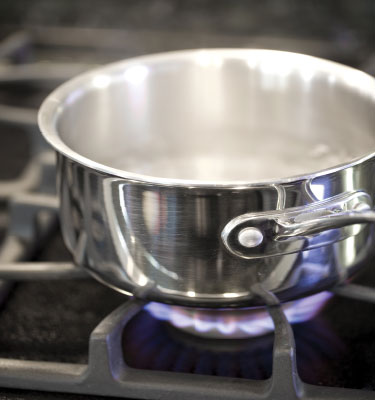Cooking technique: poaching
This article was originally published in April 2015

Poaching is a very gentle cooking technique that simmers vegetables or protein in a liquid, until the food is tender and succulent. It’s fallen slightly out of favor in a world that grills, sears and roasts so regularly, but it’s commonly seen at brunch, where poached eggs star in Eggs Benedict. Mix and match ingredients and poaching liquids to get varied results with this flexible, low-temperature technique.
Water
Water is the go-to choice for poaching when you don’t want to add flavor from the cooking liquid. An egg is a truly simple starting point; most recipes add a splash of vinegar to help the white set faster and hold its shape properly. Water can be great for flavorful spring vegetables like asparagus, too; the result is crisp and elegant.
Watch our Quick Tips for Perfect Poached Eggs video and see how easy it is!
Broth
Poaching chicken breasts adds flavor to the lean meat without adding fat or causing them to dry out. Using homemade or low-sodium chicken broth as the simmering liquid boosts the flavor of the meat, and you can add fresh ingredients like slices of ginger, lemon or green onions that will slowly infuse both the broth and the meat during the cooking process. As a bonus, the infused broth makes a tasty cup of soup, even if you’ve cooked the chicken for another use.
Oil
The classic ingredient to poach in oil is fish, and it adds an incredibly luscious richness to lean proteins like sockeye salmon or halibut. Add cloves of garlic to the oil as the fish cooks, and the result is tender cloves that add the sweetness of roasted garlic to the finished dish. Again, the gentle simmering prevents the fish from drying out, even though this method is finished in a low-temperature oven.
Poaching recipes
Find easy, delicious poaching recipes in our springtime collection. You’ll find ideas that take great advantage of the season’s crisp young vegetables and fresh fish.
